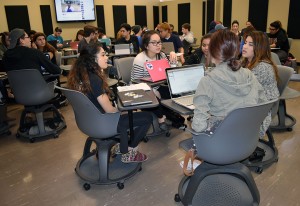Faculty Matter Teaching Tip #3 – Making Good Use of the First Day of Class
You will likely need to devote time to various administrative tasks on the first day. You may also want to dive right in and begin covering course content. But don’t miss out on this important opportunity to begin to create community and to engage students. Consider also devoting some time to “ice-breakers” and to other stage-setting activities.
- Greet students as they walk in. Arrive at your classroom early, stand at the door, and welcome students as they enter.
- Have students interview each other, in pairs or small groups of 3-4. Sample questions: Name, major, where they are from, something that would surprise you about them, something they are looking forward to this year, something they are apprehensive about.
- Create a list of class rules and expectations. Start by listing your “must haves” – expectations about cell phones and computers in class, tardiness, civility, how you want to be addressed, how students should approach you if they have concerns, etc.. Invite students to talk in pairs or small groups, and suggest other items for the list. You may be surprised by how many students have strong feelings about the importance of maintaining a respectful learning environment! Devote a few minutes to a whole group conversation. This way, if problems arise later, you can refer students to the rules everyone agreed upon.
- Identify students’ starting points. Have students complete a no-points quiz, where they indicate their level of familiarity with a dozen or so foundational concepts for the class. For example:
- Vygotsky’s Zone of Proximal Development:
-
I’ve never heard of it
-
It sounds familiar, but I don’t quite remember what it is.
-
I sort of know it.
-
I know it well and could explain it to someone else.
-
- Vygotsky’s Zone of Proximal Development:
This will allow you to get a sense of where students have a firm grasp of material and where they will need refreshers.
To get a better sense of the range of their interests, consider adding two additional questions:
- What is one of the most interesting things you remember from a prior course you took in your major?
- What is one of the most interesting things you remember from a prior course you took outside of your major?
- Have students fill out a personal profile. In addition to basic information (name, preferred way to be addresses, best way to contact, major/minor), you may want to ask them about other commitments this semester (academic load, work, family responsibilities, community responsibilities, etc..), learning styles or needs, and anything else they would like to share with you, to help you help them be successful.
- Share something about yourself. Convey your enthusiasm for teaching and for the subject matter. Consider telling students a bit about your professional background. Don’t feel compelled to share details about your personal life.

I have students write a one-page introduction, due the second day of class. I ask them to look through the course syllabus and talk about which topic seems most interesting to them and to explain why. I also have them talk about what skills they will bring to group projects.
This might sound odd but I just got an email from an NSF blog with this tip also. I have done this for years in my classes.
Cookies and conversation in the classroom? Really!
Here’s what you do:
Pick a date in your classes (large or small) early in the term
Set aside 20 minutes at the end of class
Bring 2 cookies per student (get good ones)
Talk to students about your research interests, why you wanted to be professor, your work experiences, hobbies…pick what’s comfortable.